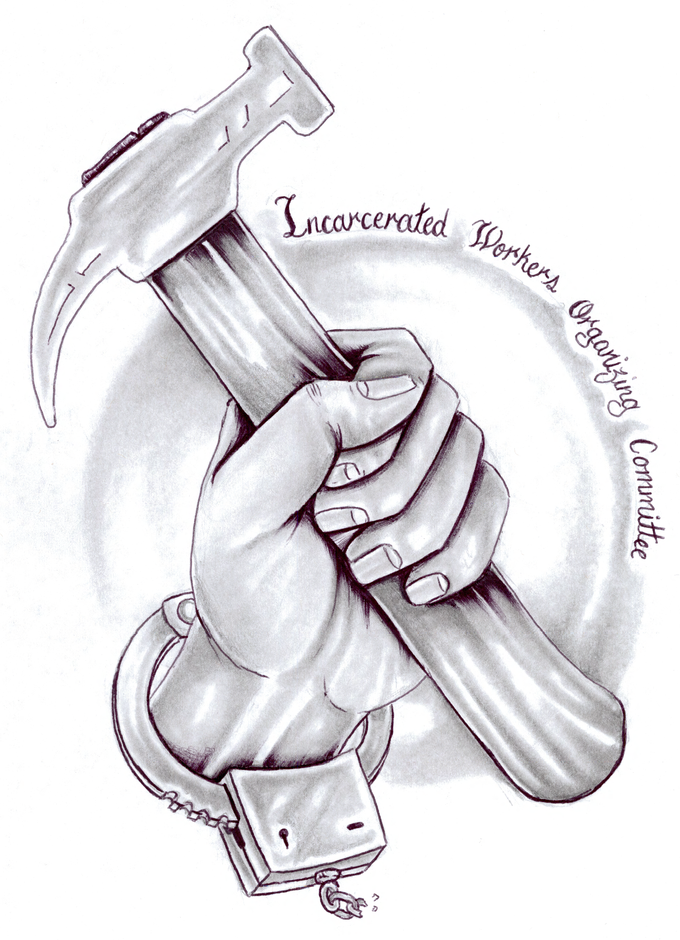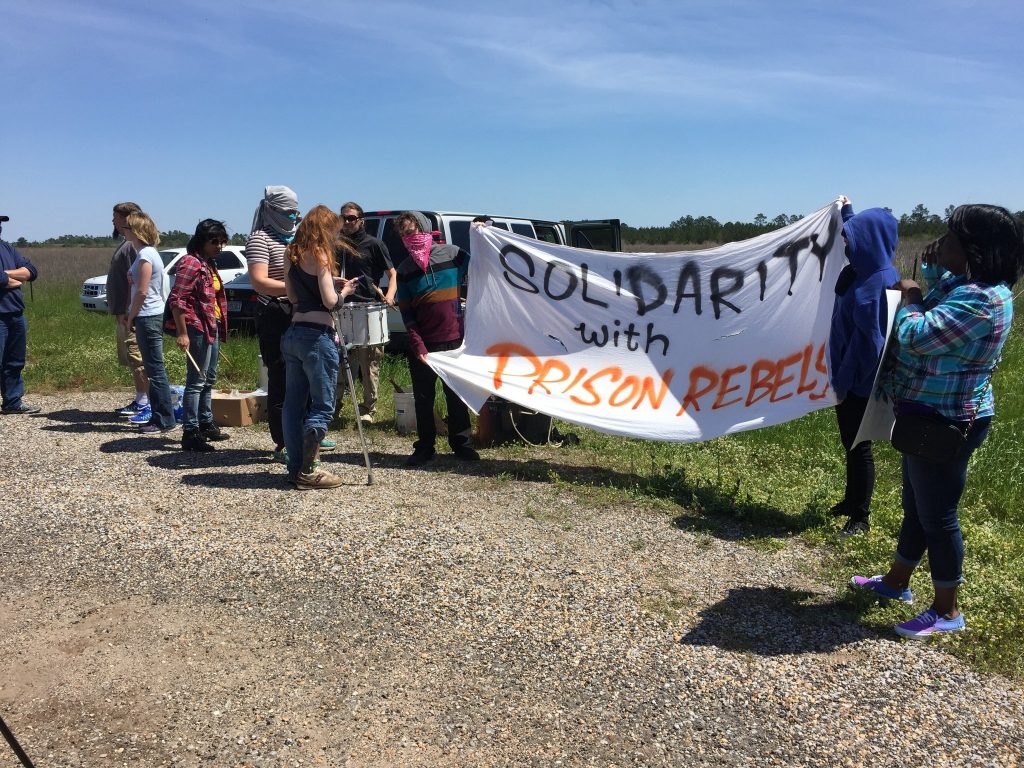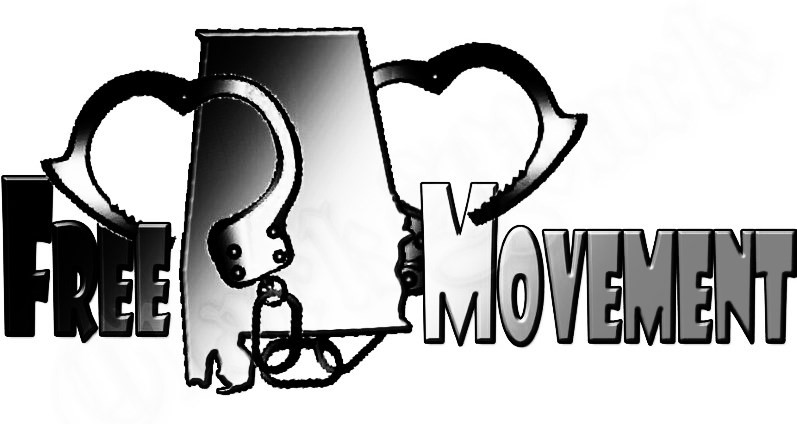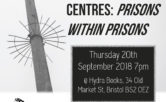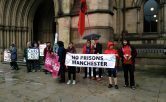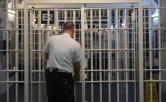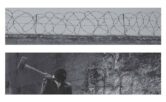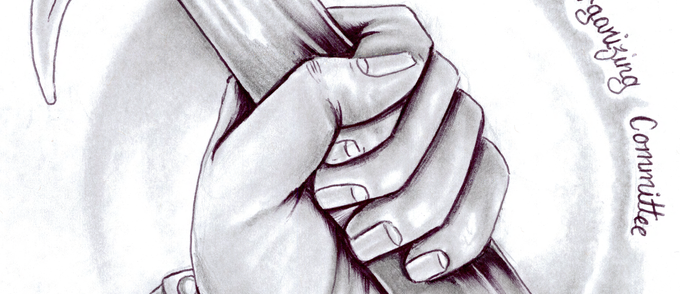
Organizing the Prisoner Class: An Interview with IWOC
This a brilliant article from the US about the role that IWOC has been playing in supporting prisoners across multiple states.
Source: https://itsgoingdown.org/organizing-prisoner-class-interview-iwoc/
The Incarcerated Workers Organizing Committee, or IWOC, is a committee within the Industrial Workers of the World (IWW), that is working to offer support for workers already self-organizing from behind prison walls. As we speak, actions in Texas prisons are ongoing, while riots and resistance continues at Holman Prison in Alabama. This May Day, prisoners with the Free Alabama Movement (FAM) are calling for a strike, anarchist and anti-prison groups are organizing demonstrations in solidarity, and IWOC and other groups are building for national actions on September 9th. Wanting to know more about how a small group has managed to sign up hundreds of prisoners and build for large actions, we caught up with IWOC to learn just how it’s going down.
It’s Going Down: How did IWOC form? What was the inspiration for the group?
Incarcerated Workers Organizing Committee: Prisoners have been fighting for the right to unionize since probably as long as workers in the free world have. In the 1970’s these efforts hit a high water mark, George Jackson and many other prisoner advocates were agitating for the right to unionize. Eventually, in 1977 The US Supreme Court decided in Jones v. North Carolina Prisoners’ Labor Union, 433 U.S. 119 that prisoners’ right to organize unions is not protected under the first amendment to the constitution.
Of course, the supreme court didn’t really stop the prisoners. Efforts to organize continued and in the last ten years, there has been a spike in prisoner organizing and protest. Between the historic Georgia workstoppage of 2010, the California hunger strikes and the Free Alabama Movement, it became clear that people were organizing and standing up as a class, in spite of the Supreme Court’s ruling. The basic components of a prisoner’s labor union were there already when Lee Wood, author of Prison Slavery, approached us about supporting the Free Alabama Movement. Our friend Lorenzo Kom’Boa Ervin, a released political prisoner, black panther and founder of the Black Autonomy Federation had detailed how a union approach could be beneficial but the outside support was lacking in those campaigns.
We formed the Incarcerated Worker’s Organizing Committee (IWOC) to try and address this need. At the time, the reality of actually facilitating prisoners having unions was brand new to several of us on the committee and we were originally just asked to help with FAM’s campaign. Over time, we migrated toward expanding the scope from just providing support to actually developing plans for how we could facilitate the unionization of prisoners. It has been very exciting.
Video: RT America’s Anya Parampil talks to Jim Del Duca of the Incarcerated Workers Organizing Committee about… https://t.co/Y7s5CORT6L
— Sam Tyler (@RadNewsMedia) April 6, 2016
IGD: Can you explain the motivation to organize prisoners within the IWW framework, what are the “pro’s and con’s” so to speak of this organizational method?
IWOC: The idea of going at the prisons from the angle of labor organizing is not new. George Jackson and others have worked on this approach. Essentially when we talk about tying prison issues to labor issues, we are talking about building a mass working class movement. One pro would be giving working people a reason to care about prisoners thus tying major segments of the population together for some common goals.
We believe that the best way to force change is to empower those being oppressed and to organize in a way that centers the power of those people. In prisons, like in much of capitalist society, nothing can run without the labor and consent of prisoners. Therefore we work with prisoners who are self-organizing to attack that pressure point–their labor or consent.
Moreover, making demands to improve conditions–like minimum wages, quality food, access to real health care, education, and reentry programs, etc–all raise the social cost of prisons to a level that is unlikely for the state to pay, especially in this era of budget cuts.
The pros of this is the possibility–if we also grow an outside mass movement–to significantly move towards the abolition of the prison system. There are some complications to this, including working with people with a variety of political approaches and consciousness, but that is part of the work.
We’re LIVE from @IWW_IWOC‘s panel on ‘Abolish Now: Supporting Mass Prisoner Resistance’ https://t.co/oknB5QFthW pic.twitter.com/azmkwXHy4U
— Unicorn Riot (@UR_Ninja) April 10, 2016
Cons- prisoners are not allowed to organize. Just by signing up for a union (or any organization other than a religious sect) they face the possibility of being put on a security threat group list, which can mess with their security level and chances of early release or parole. For this reason, IWOC does not have official membership, the way a traditional union would. Some of the routine processes of the IWW do not apply under these circumstances, but we are learning how to adapt and work around that.
Pros- institutional support and longevity. The IWW has a large membership, ready-made resources, a known history of militant organizing for working class people. The demands and needs of prisoners in struggle vary widely from state to state and depending on security level. By creating an organization, rather than just reacting to each individual situation we are able to develop best practices, understand differences in various struggles, and provide reliable support. Rather than reacting to situations that the DOCs or state governments create, or that spontaneously erupt, we help prisoners create situations where they have a greater choice of tactics and demands. Yes, that includes negotiations for partial solutions or “reforms” but the hope is that these reforms will be more likely to empower prisoners than pacify them. Incarcerated people are living under circumstances of severe deprivation which can make daily life incredibly difficult. If they aren’t struggling and scraping for things like basic nutrition, or soap, they’ll be better positioned to fight for their freedom.
Also, mass incarceration is on the menu for reformists, in a big way. The presidential candidates are talking about prison reform, Van Jones and The Koch Brothers have formed a much lauded “bipartisan coalition” that is going to push through changes to this system, changes that follow the priorities of the ruling class. By organizing and empowering prisoners to made demands, we take the narrative away from these non-profits, opportunist politicians and lobbyists. Reform is coming, IWOC is doing what we can so reform reflects the priorities and follows the timeline of the prisoners and the communities they come from, rather than the ruling class.
IGD: How did IWOC begin to sign up IWW members? What was that process like?
IWOC: We created literature and sent it in along with membership applications. There is a wealth of writing from woke prisoners on the internet which guys inside don’t often have access too. Once we mailed a few things in, word spread like wildfire. Prisoners often have a lot of time to really contemplate things, and many were keen to collectivise their struggles and connect them with the outside world. It was not hard for people to develop a solid understanding of what we are about and to get on board. In addition, literature often migrated to social leaders so there have been several instances of mass sign ups when a single prisoner sees the potential for using the IWW to organize and shares it with their friends.
IGD: How did IWW membership spread across the various prisons?
IWOC: At this point we don’t even know how many prison newsletters, publications, and individual letters between prisoners are promoting IWOC. Anthony Rayson of the massive South Chicago Zine Distro was one of the first to start sending IWOC information in with his zines and several Books to Prisoners operations also send our information in. Prisoners write to us, sharing all their friends’ names and contact info and ask us to send more information.
It has been hard to keep up with demand, and the cost of postage is one of the most limiting factors. We created this fundraiser in hopes that our community could chip in to help cover that cost.
IGD: Has there been any attempts by prison officials to block the spread of the IWW, stop it’s literature from coming into prison, or repress incarcerated comrades from organizing? How do you respond to this if it does happen?
IWOC: We try to be pro-active against the exclusion of mail from facilities. Some of the zines we send in have a “free speech primer” for prison mailrooms on their inside cover, which cites the legal precedents that say they can’t block stuff just because they don’t like it. Sometimes mail still gets rejected, it seems like it often depends on mailroom staff and maybe what they ate for breakfast or something. Prison staff is often very arbitrary and unpredictable when it comes to enforcing rules, sometimes they don’t enforce rules that do exist, other times they make new rules up on the spot. What did the US Supreme Court say about the administration of the death penalty? Something poetic, like “states can kill folks, so long as they don’t do it in a freakish and wanton manner”. Well, far as we can tell, freakish and wanton is kind of standard practice for the prisons, so I kind of doubt executions always meet that standard.
As far as our legal protection goes, it is also pretty weird as we understand it, prisoners do not have a right to join a union in states where it has been banned, but we do have a right to mail them union literature. Some states prisons can only monitor incoming mail for contraband, not the stuff the prisoners mail out (because contraband exiting the institution is not a “valid penological concern”) in other states, they can. The law does not map perfectly unto reality.
If people are interested in distributing educational materials to prisoners we’d be happy to share some other techniques we’ve found that help. Just drop us a line at iwoc [at] riseup.net. The main problem we have is getting our newsletter The Incarcerated Worker in. That’s available here. We really try to tone it down, but it’s hard to quiet such passionate voices just for the whims of censor-happy mailroom staff. To this point, when they reject it, we just go through the official channels to complain. We have not started exploring a First Amendment lawsuit or anything yet, though we have heard that can work.
IGD: How are decisions made within the IWOC in regards to the organizing that is carried out or the publication that is produced? How do you coordinate work with people that are both incarcerated and on the outside?
IWOC: I feel like if being an outside organizer were a job, the job title would be something like “secretary”, or “administrative assistant” we often are really nothing more than conduits for communication between the prisoners, only occasionally chiming in regarding strategy. We have to do things like draft press releases and make decisions when time doesn’t allow for communication with folks on the inside, but we try to make sure those decisions and statements are representative of what we’ve heard voiced from many of the prisoners, and not our personal thoughts or feelings.
Nearly all interactions occur via snail mail. It is slow and plodding work. A conversation that could take minutes in person can take weeks. Some members in prison have varying amounts of phone access so that’s helpful. People often encourage us to use the prison email system, but part of why the prison uses that stuff is because it stores the text of the correspondence in a keyword searchable format, which makes monitoring and shutting down communication extra easy for them. The outside support team are really pretty small right now so it’s a constant challenge to keep things moving, but the people we do have are really, really dedicated. We are ready for this to be a year’s long process.
IGD: How have movements inside prisons, such as the Free Alabama Movement played a role in the IWW’s work inside?
IWOC: FAM is integral to everything we do. We have been working with them for a few years now and do all we can to support their efforts. We include FAM literature in many of our mailers and now there are prisoners in several other states adopting their organizing strategy, as laid out in their essay “Let the Crops Rot in the Fields”. There is a Free Virginia Movement, a Free Ohio Movement and then there is Texas, where prisoners jumped into a full-on work stoppage before drafting declarations or freedom bills.
We also send news in of uprisings and incidents of resistance and are always trying to connect prisoners to other prisoners so they can build together.
IGD: What do you see as the potential for mass organizing incarcerated workers to be?
IWOC: Abolishing slavery and capitalism. We really believe that prison is the glue that holds this whole crooked house of cards together and we’re excited to see what happens if someone takes their adhesive away. Also, when the demands are things like “let us eat food”, “stop torturing us” and “we will not be your slaves any longer” it really drives a stake in the fragile legitimacy of America’s democratic government. Liberals and politicians often balk at the suggestion that slavery continues in US prisons, but when the prisons are in crisis because the prisoners won’t maintain them anymore, they have to look closer and see that it is true.
Just like any other locus of struggle there will be reform efforts to try and tamp down this crisis, and many prisoners will get on board with those reforms, while others continue to fight for total freedom. The difference is, prisons cannot run without slavery and torture, so even the most basic reforms can drive the cost of operations through the roof, and continue the crisis.
IGD: You mention that “prison is the glue that holds this whole crooked house of cards together” however I am reminded of something that Alfredo Bonnano addressed in some of his writings on prison:
[I] don’t agree with the abolitionist position, not because I want prisons, of course, but because I don’t agree with a position that wants to abolish part of a whole that cannot be dissected. In other words, I don’t think that it’s possible to talk about abolition as opposed to attack. In other words, I don’t think that it’s possible to propose a platform to abolish one aspect of a context that is organically inseparable. I don’t agree with proposals to abolish the judiciary, because for me such proposals don’t make sense; or to abolish the police for that matter. That doesn’t mean that I’m in favour of the judiciary or the police. In the same way, I don’t agree with the abolition of the State, only its destruction.”
– Alfredo Bonnano, Locked Up
How I read this is that abolishing prisons as separate from all the other apparatuses of domination will not actually do away with the domination that we wish to destroy. Based on your response it seems you disagree with this assertion, would you care to elaborate?
IWOC: I suspect that “abolitionist position” Bonnano was speaking of is a very different abolitionism than what IWOC and our allies envision. A prison abolition that leaves the state intact might be a serious position in Europe, here in the US I’ve only heard fringe academics adopt that position (and even they are often taken to task by other fringe academics with more radical anti-state positions).
Whenever I’ve heard IWOC, Critical Resistance, InCite, or any serious US-based abolitionist organization speak of abolishing prison, they have included policing, the courts, probation, state-run-restorative justice, etc as part of the prison industrial complex, part of what is to be abolished. They do not dissect prison from the whole. Our “prison is the glue” answer posits that prison is vitally connected to all the other apparatuses of domination. They depend upon prison, so for us, attacking the legitimacy of prison is a means to destroy the state, or at least erode it’s power. We are anarchists, bitter enemies of the state, and we focus on prison because we are looking for the weakest spots in our enemies armor. We also acknowledge that destroying prisons doesn’t necessarily mean destroying the State and that any organizing for abolition should be organizing for abolition of all systems we might wish to destroy: prisons, capitalism, white supremacy, patriarchy, etc.
IGD: What are the main challenges you face in your work? How are racial divisions in prisons fought against?
IWOC: The main challenge is getting people on the outside involved. This is a slow, quiet, and tedious process. Like I said earlier, we act a lot like administrative assistants. There is little glory in it, unless you’ve got the kind of imagination that can find glory in paperwork. It is also hard, emotionally. A lot of people read letters from prisoners who are being tortured and they shut down and never come back. Others get caught up writing elaborate personal letters to just a few individuals rather than working quickly to reach out to the largest possible number of contacts.
If you’ve followed or done work with political prisoners through groups like The Anarchist Black Cross, you’ve surely heard stories of inhumane deprivations that can come about in prisons. Working with IWOC you get to see how ubiquitous these tragedies are. The American Bar Association put out numbers a few years ago and 98% of people in prison didn’t get trials. There is no justice in this system, and much hardship. Keeping an eye on collective action without being entirely robotic and auto-responding to every letter when 80% of them could break your heart or boil your brains if you let it is hard as hell.
On the inside, challenges seem to be similar. Folks complain about prisoner apathy a lot. The general tip most people in prison are on is to keep your head down and do your time, either that, or get yours wherever you can, regardless of who pays the price. There’s also various forms of retaliation from petty harassment to isolation and beatings or outright torture.
“LET THE CROPS ROT IN THE FIELD”, by Free Alabama Movement. That’s how you end mass incarceration AND prison slavery.
— FreeAlabamaMovement- (@FREEALAMOVEMENT) March 20, 2015
Racism is different in prison. There are at least three kinds of racism in the US. First is the kind most of us are familiar with on the outside: color blind people who would never use the N-word and who might even thoroughly examine their prejudices and micro-aggressions against others, but would never put their body or their time on the line to have the back of someone who’s getting beaten or killed. The second kind is the overt nazis, the tattooed aryan gang members who have bizarre and reprehensible ideas about who is responsible for their class position and personal hardships. Prison is full of these folks, but I have heard many stories of them jumping in when a guard is kicking the shit out of a black guy, or starving them in a torture cell. Under certain circumstances, they are ironically, better allies than the most conscientious of liberals. The third kind of racism is the systemic racism that continues these institutions of white supremacy that we have inherited from our history of slavery and genocide. Prisoners of color often seem to be able to understand how to leverage an uncomfortable cooperation with the second kind of racism to take on the third, and we try to join them in that.
Coordination across racialized gang lines has been a feature of most recent major prisoner’s movements. It was in the list of demands coming out of Georgia, the Agreement to End Hostilities from gang-identified leaders in the California hunger strikes, and in the background of other activities. It isn’t accurate to use broad brush words like solidarity, or unity to describe these things, though in some instances, prisoners do use that language, like in the 1993 Lucasville Uprising where prisoners spray painted “convict unity”, “black and white together” and even “convict race” on the walls of the occupied cell block. Strategic coordination against common enemies seems more likely. There have also been prisoners who reject that strategy and condemn outside supporters who adopt it. But IWOC hasn’t had a terrible lot of conflict about this, as of yet.
IGD: You’ve discussed the need to engage more people in support the struggles of IWOC prisoners and by extension FAM and other formations, but how would that look in your eyes? In cities where there is not an IWOC presence, how do you think people that want to show solidarity should organize themselves to support these prisoners? While we know there is not a one size fits all answer, were curious if you have an insight into what a broad support movement for self=organized prison resistance movements could look like on the outside.
IWOC: We find the FAM strategy described in “Let the Crops Rot in the Fields” pretty compelling. Build relationships with prisoners, get them the information about struggles occurring which they may choose to join or emulate, build relationships with friends and families of prisoners, mobilize and demonstrate outside support levels–solidarity rallies at McDonalds, for example, to help prisoners in your region make tactical decisions, network strategically with other organizations doing this work, and join the prisoners by protesting on the sites of the prisons, jamming their phone lines with support calls, or otherwise letting the administration know that the prisoners are not struggling alone, that they will no longer have such an easy time going through their typical routines of repression.
IWOC has an infrastructure and experience doing these things, we are learning a lot and developing a set of best practices that can help make the task of supporting prisoner resistance less daunting. We’re happy to work with people who are not IWOC members, or to help people set up IWOC chapters and plug directly in.
IGD: In the May 2008 issue of the Industrial Worker (#1705) the General Executive Board of the IWW issued a statement that essentially threw Marius Mason under the bus, because the charges against him were “unrelated to union activity.” This statement was never withdrawn to my knowledge. Could you clarify the logic behind this statement and how IWOC differs from this perspective?
IWOC: We disagree with General Executive Board’s position and tone in that article, both the judgemental assertion that Mason’s activities came from desperation and powerlessness, and the smug statements about worker organizing always being superior. IWOC recognizes and values many different kinds of struggle and we look forward to helping prevent the GEB from making such callous statements in the future. That said, we don’t put anyone or their actions beyond critique, including us and our comrades. We choose to focus our limited energies on collective actions by incarcerated people and hope that people who find strategic value in that work join us in doing it, while those who value other approaches pursue the strategies that resonate with them instead. We are interested in people working on the things that inspire them to action.
IGD: Anything else you’d like to say? How can people support your work?
IWOC: A) If you are in the IWW, please get with your branch and get with this work!
B) If you are not in the IWW, join now. Even though dues are super cheap, every little bit helps.
B) If you have a prisoner program and would like to coordinate with us, please contact us at: iwoc [at] riseup.net
C) We are fundraising to hire a full time person to work on IWOC. Please donate here!
